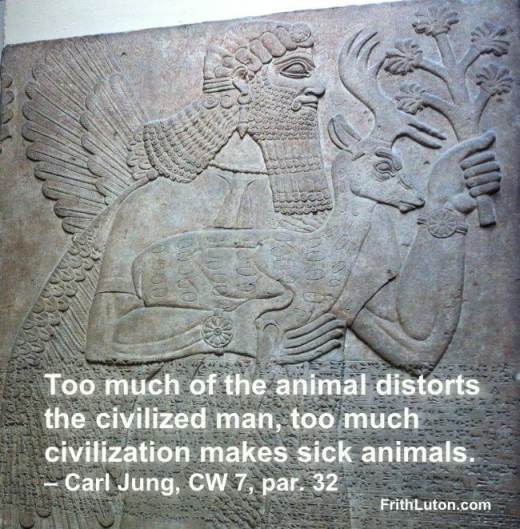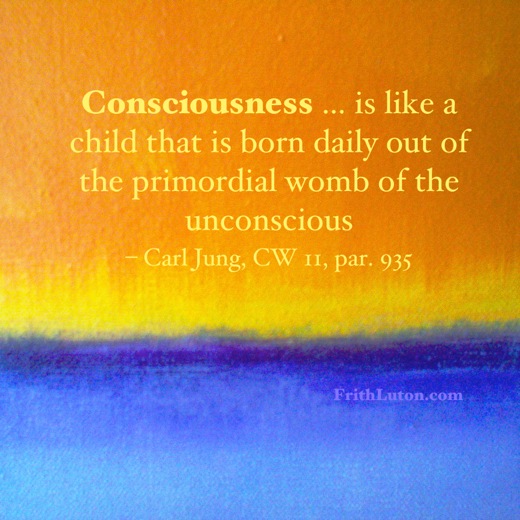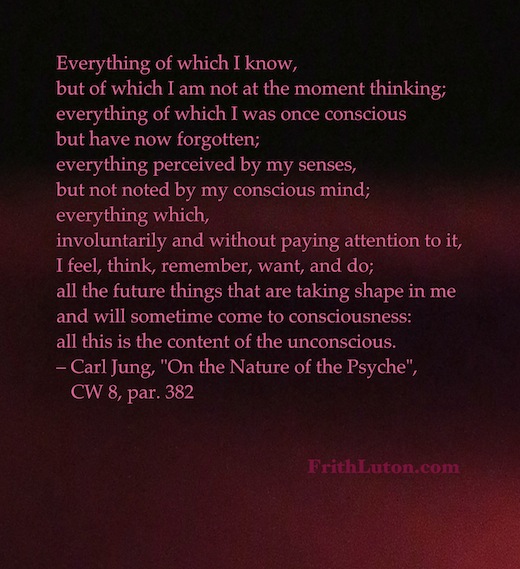One of Jung’s basic beliefs, and arguably his most important message, is that the purpose of human life is in becoming conscious.
“As far as we can discern,” Jung writes, “the sole purpose of human existence is to kindle a light in the darkness of mere being.” – Memories, Dreams, Reflections, p. 326.
The reason why consciousness exists, and why there is an urge to widen and deepen it, is very simple: without consciousness things go less well. – Carl Jung, CW 8, par. 695

Part and parcel of this is achieving a balance, a right harmony, between mind and body, spirit and instinct. When we go too far one way or the other we become neurotic. Jung says it in one pithy sentence:
Too much of the animal distorts the civilised man, too much civilisation makes sick animals. – “The Eros Theory,” CW 7, par. 32
Civilised versus Instinctual
The “civilised man” tends to live in his head. He prides himself on a rational approach to life, and rightly so. We are no longer apes. Thanks to reason, science and logic, instead of hanging from trees or living in them, we cut them down to build houses, which we then fill with appliances in order to make life easier, or, as it happens, more complicated.
All the same, the more we lose touch with our other side, our instinctual base, the more likely it is that something will happen in us to bring about a proper balance. This is the basis for Jung’s idea of compensation within the psyche. One way or another, we’ll be brought down to earth. It is just when we think we have everything under control that we are most apt to fall on our face, and this is especially true when we don’t reckon with the uncivilised, ten-million-year-old animal in us.
That being said, unexamined instinctual behaviour is a hallmark of unconsciousness and a notable characteristic of the undeveloped personality. Through analysis one can become conscious of the instincts and the many ways in which we are slaves to them. But this is not done with a view to giving them boundless freedom. The aim is rather to incorporate them into a purposeful whole.
The Role of Consciousness
Jung defined consciousness as “the function or activity which maintains the relation of psychic contents to the ego.” [CW 6, par. 700] In that way he distinguished it conceptually from the psyche itself, which is comprised of both consciousness and the unconscious. Also, although we speak of ego-consciousness, in Jung’s model the ego is not the same thing as consciousness, but simply the dominant complex of the conscious mind. Of course, in practice we can only become aware of psychic contents by means of the ego. In other words, the more we know about what’s going on in our unconscious, the more conscious we become.
Becoming conscious preeminently involves discriminating between opposites. Since the basic opposites are consciousness and the unconscious, the first hurdle is to acknowledge that there are some things about ourselves we’re not aware of. Those who cannot do this are doomed forever to skim the surface of life. For those who can admit to another side of themselves, there is then the daunting task of discriminating between a whole range of other opposites—thinking and feeling, masculine and feminine, good and evil, and so on. And then there is the crucial difference between inner and outer, oneself and others.
Ways of Enlarging Consciousness
Jung describes two distinct ways in which consciousness is enlarged. One is during a moment of high emotional tension involving a situation in the outer world. We feel uneasy for no obvious reason, or strangely attracted to someone, and suddenly we understand what’s going on. The other way is what happens in a state of quiet contemplation, where ideas pass before the mind’s eye like dream images. Suddenly there is a flash of association between two apparently disconnected and widely separated thoughts. In each case it is the discharge of energy-tension that produces consciousness. These sudden realisations and flashes of insight are what we commonly experience as revelations.
In Jung’s model of the psyche, consciousness is a kind of super-structure based on the unconscious and arising out of it:
“Consciousness does not create itself—it wells up from unknown depths. In childhood it awakens gradually, and all through life it wakes each morning out of the depths of sleep from an unconscious condition. It is like a child that is born daily out of the primordial womb of the unconscious. … It is not only influenced by the unconscious but continually emerges out of it in the form of spontaneous ideas and sudden flashes of thought.” – Carl Jung, CW 11, par. 935
Elsewhere he uses a different metaphor:
In the child, consciousness rises out of the depths of unconscious psychic life, at first like separate islands, which gradually unite to form a “continent,” a continuous land-mass of consciousness. Progressive mental development means, in effect, extension of consciousness. – CW 17, par. 326

Stages of Becoming Conscious
A child lives in a state of oneness with its primary care-giver. There is little separation between subject and object. As the growing child assimilates experience and develops personal boundaries—a sense of self separate from the outside world—so the ego comes into being. There is a recognisable sense of personal identity, an “I am.” This goes on in fits and starts, until at some point you have this metaphorical “land-mass of consciousness,” surrounded by the waters of the unconscious.
The first half of life generally involves this developmental process. Given decent mirroring in the early years, we stand a good chance of acquiring a healthy ego. But again, this is not the same thing as being conscious. There are lots of take-charge people with very healthy egos—captains of industry, politicians, artists, entrepreneurs and so on—who are quite unconscious. You can be a leader, run things like a clock and manage others well. But if you don’t take the time to introspect, to question who you are without your external trappings, you can’t claim to be conscious.
Mature consciousness, according to Jung, is dependent on a working relationship between a strong but flexible ego and the Self, regulating centre of the psyche. For that to happen one has to acknowledge that the ego is not in charge. This is not a natural process; it is a major shift in perspective, like the difference between thinking the earth is the centre of the solar system and then learning that the sun is. This generally doesn’t happen until later in life, when you look back on your experience and realise there was more going on than you knew. Ergo, something other than “you” was pulling the strings.
Becoming Conscious of our Complexes
Becoming conscious, then, is above all not a one-time thing. It is a continuous process, by the ego, of assimilating what was previously unknown to the ego. It involves a progressive understanding of why we do what we do. And a major step is to become aware of the many ways we’re influenced by unconscious aspects of ourselves, which is to say, our complexes.
Jung visualised the unconscious as an ocean, because both are inexhaustible. Freud saw the unconscious, or subconscious, as little more than a garbage can of fantasies and emotions that were active when we were children and then were repressed or forgotten. Jung accepted that for a while. He was an early champion of Freud’s dogma, but in the end it just didn’t accord with Jung’s own experience. Jung came to believe instead that the unconscious also includes contents we never knew were there: things about ourselves in our personal unconscious, and then, at a deeper level, the collective unconscious, all the varied experiences of the human race, the stuff of myth and religion—a vast historical warehouse. Under the right circumstances, any of this, at any time, can become conscious. Jung writes:
Everything of which I know, but of which I am not at the moment thinking; everything of which I was once conscious but have now forgotten; every thing perceived by my senses, but not noted by my conscious mind; and everything which, involuntarily and without paying attention to it, I feel, think, remember, want, and do; all the future things that are taking shape in me and will sometime come to consciousness: all this is the content of the unconscious. [“On the Nature of the Psyche,” The Structure and Dynamics of the Psyche, CW 8, par. 382]

And that is why, in spite of our best efforts in becoming conscious, we will all, always, be more or less unconscious.
© from Daryl Sharp’s Digesting Jung, reproduced with kind permission of the author.